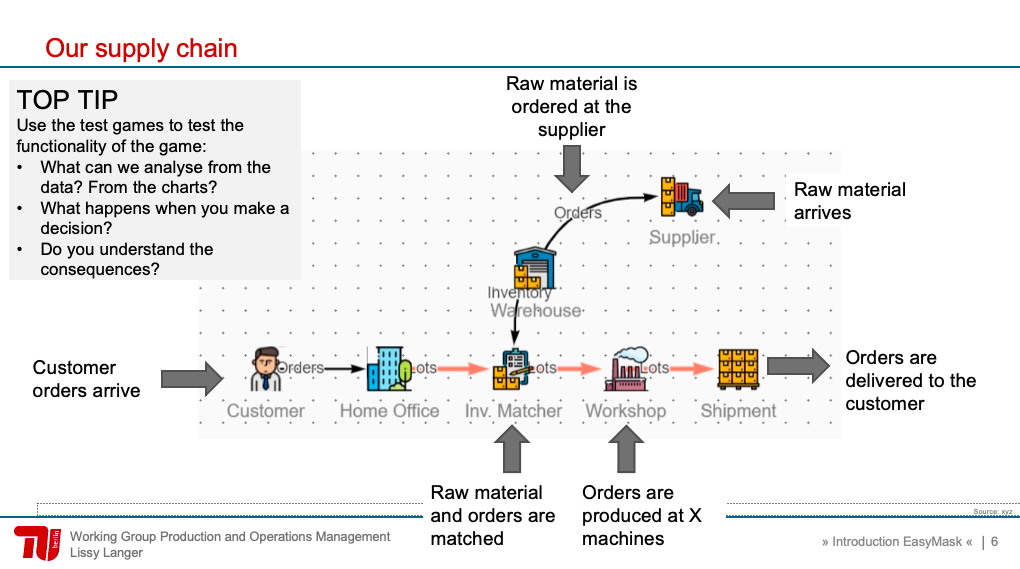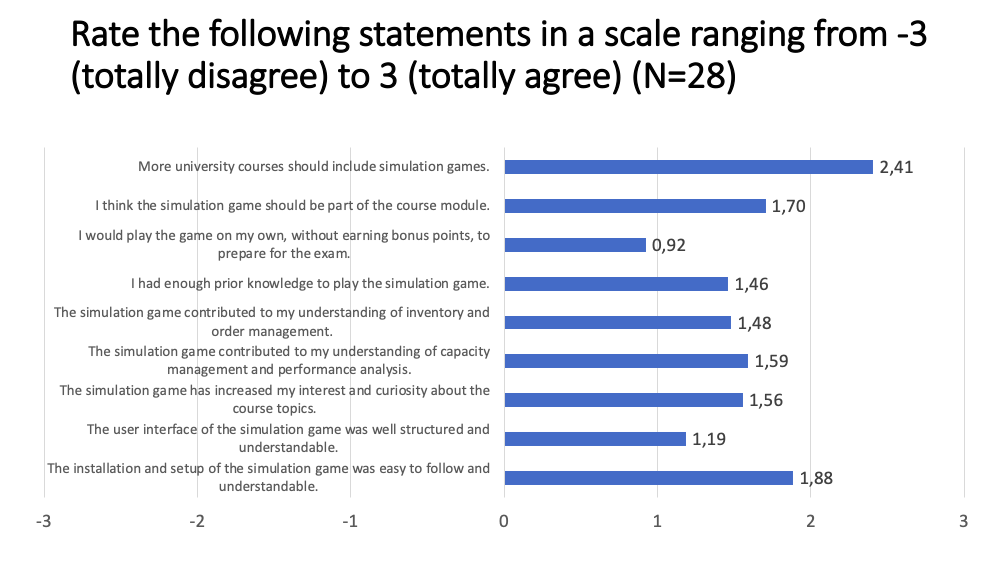The first student LTT was conducted virtually in September 2021. The 117 participants of the 28 teams were mainly students from an introductory course in operations management which took place at Technische Universität Berlin in summer 2021 and from a course which had just started at CentraleSupelec.
After the introductory session on the 20th September the students were asked to build and sign up their teams on the second day and to test the game on the following two days with their team members. They played three levels with rising difficulty on the main game day of the activity on September 24 in the morning. Afterwards, they were asked to answer a quiz and give feedback in an evaluation questionnaire. Based on their quiz scores, they were able to gain bonus points for their exam.
The introductory sessions and the previous lecture sessions were also available online for the students to refresh their memories. The student groups had separate breakout rooms to discuss their strategy and to make decisions, and could use the chat to discuss with the other teams. Consultation sessions (Q&A Sessions) were provided for them during the testing phase of the third and the fourth day by the lecturers.
We started with an introduction to the game and the web interface and gave the students some tips and tricks on how to improve their team work. This session was recorded and provided to the students.
In the game session on September 24, the students were split into three gaming groups and in each group were competing against the other teams to lead their factory into success. After each level, we conducted a small session where the student teams were able to discuss and share their solution approaches. The levels increased in difficulty, so all teams were able to learn how the overall setup works and adapt their lessons learned in the next level. The final level was used to generate winners of the three game groups and an overall winner. These three teams received a small price and gained some guaranteed bonus points as part of their course work.

We also evaluated the student experience. A total of 53 participants interacted with an anonymous evaluation survey, designed on Qualtrics by the UCL team, from September 23 to October 1. However, only 28 answered all or some of the questions in the survey. The survey comprised closed, open and Likert-scale type of questions, and was organized in three main sections: what participants liked about the game, what participants think could be improved, and how they worked as a team. A report was produced and shared with all partners.

The second student LTT was conducted virtually in May 2022. The 16 participants of the 8 teams were students from TU Berlin, CentraleSupelec Paris, Politecnico di Milano and University College London.
The students were first asked to get familiar with the game developed within the project context, that is by going through the game manual and the introductory videos provided on the project wiki and then to test the game on a test instance that was provided for individual experimenting. A Q&A session was then offered on the morning of the 5th of May for the students to ask any questions regarding the game, its purpose, interface or context.
On the main event day, the 6th of May, after an introduction to the project and the game, the students played one instance individually and then 2 instances in groups. The groups were formed in a way that made sure that participants of the same group were from different universities. The difficulty of the game increased with each instance. Towards the end, students were asked to fill out an evaluation of the game, where they could share feedback regarding the game, the experience or any comment around the topic.
The event was held using Zoom and was in the format of an online meeting, which allowed for breakout rooms, where groups could prepare for each instance and discuss their strategies and moves during the game. At the end of each instance, the winning team shared its strategy and went through the actions that led them to victory.
A round of feedback took place at the end of the event where students expressed their opinions about three main topics: the experience of playing in international groups, the experience of using knowledge in operations management to play a game, and whether they think that such a game should be integrated into their lectures. The feedback included points regarding what could be improved, constructive criticism and an overall agreement that such a game can make the learning experience more dynamic and practical instead of being strictly theoretical.
